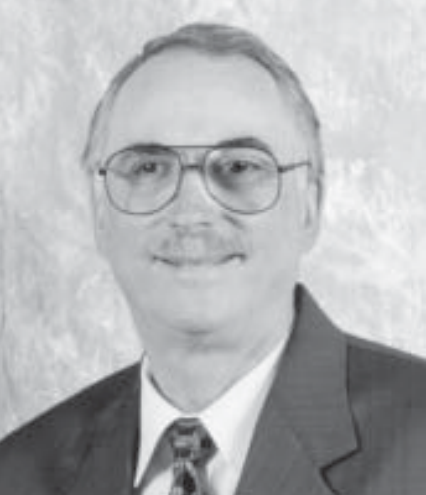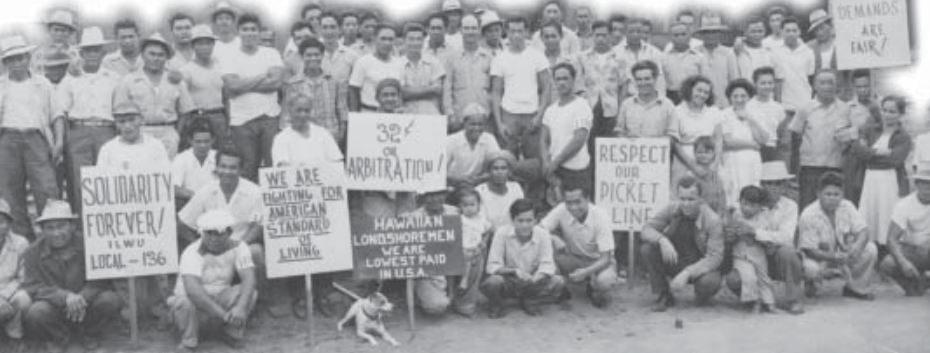That is why the ILWU International and our Longshore Division have emphasized education over the last several years. The 1994 International Convention and the 1997 Longshore Caucus put programs in place that have proven popular and effective, and both the ILWU International Convention and the Longshore Caucus budgeted funds in 2003 to expand them.
2003 to expand them. Over the past six years the Titled Officers and the International’s Department of Research and Education developed two Leadership Education and Development (LEAD) Institutes and three SecretaryTreasurers’ conferences to train and update local officers and trustees on administrative procedures and legal record-keeping for unions.
The first LEAD Institute, held in Palm Springs, Calif. in 1998, focused on the importance of dissent and democracy in the union. In September 2003, again in Palm Springs, LEAD participants examined the many ways diversity has been the bedrock of the union. An advanced LEAD Institute is scheduled for February 2005 for graduates of the first two programs— and another basic LEAD will be held in September 2005. The advanced LEAD will highlight ILWU strategies for successful collective bargaining, and the basic LEAD will feature training in the skills necessary to implement and protect the ILWU’s hallmark tradition of rank-and-file democracy.
The Secretary-Treasurers’ Conferences, which included local union trustees and—unique to the ILWU—the clerical employees who manage and service many of our affiliates’ offices—were held in 1999, 2001 and 2004. These events have helped our local officers, rank-andfile committee members and trustees administer the union’s affairs more effectively and democratically and keep up with the anti-union rules imposed on labor by the Bush administration.
Inspired by the mandate of the 2000 International Convention, the International’s education program has also developed materials and workshops for training local union stewards. Since early in 2003, these trainings have been held at the request of several locals, including 6, 20, 30 and 63 (Office Clerical Unit).
Separately, the Caucus established the Longshore Division’s Education Committee in 1997 to help meet the mounting challenge of educating our new members about the union and to train the new generation of longshore stewards and union officers. The committee coordinated its first major event in the spring of 2001—a seminar on grievancehandling and the evolution of key provisions of the Coast Contract. In August 2003 the committee put on a seminar about the longshore arbitration procedures and grievance machinery in San Francisco, reviewing the contract and its enforcement provisions for local officers and business agents. In November and December 2003 the Coast officers held regional workshops for the Puget Sound, Columbia River, Northern and Southern California areas on the 2002 contract struggle and the importance of political action and community solidarity for the union.

James Spinosa
ILWU International President
The Longshore Division is planning several future educational events, including a seminar on “The History and Traditions of the Longshore Division” Sept. 26-30, 2004. This training will familiarize local union activists with the past, present and future mission and goals of the union. More information can be found on the Longshore Division’s page of the ILWU’s web site, www.ilwu.org. The Division is also planning seminars on international relations and solidarity; health and welfare benefits; and the Coast Safety code.
The International has developed tools to help the locals, but one size does not fit all. Locals need to set up education committees and figure out ways to hand down union knowledge that fits their circumstances. The union’s officers and staff can help with this process.
This union’s militancy, solidarity and effectiveness have made it a target of the Bush administration as well as the employers. We know our longshore employers are organizing and preparing for the next contract, which comes up in four years. And in the meantime the ILWU’s Warehouse and Marine Divisions, as well as our thousands of members in various industries in Hawaii, remain under siege. Everything we need to do to meet these challenges requires an informed and educated membership.
Particularly in the Longshore Division we have thousands of people in our casual pools up and down the Coast who we are not servicing properly. We have got to conduct regular meetings with them to draw them into the union, starting out by talking safety and showing them they are part of the industry. They are the future of the ILWU, your future. When you retire, you’re going to be depending on them to have the right principles to make sure the traditions of this union are carried on.
So now more than ever it’s important to attend your local’s membership meetings to keep up to date on what’s happening in your industry and your union. And now more than ever it’s important that member education be done at every level, from the International to the locals to the docks. Each of you needs to be a guardian of the union’s history—and make our future stronger by passing that history on. ◆
History & Traditions Conference
Thirteen members from Local 142’s longshore division will be attending an important and extraordinary five-day conference on the history and traditions of the ILWU longshore division at the Riviera Resort Hotel in Palm Springs, California from September 26-30, 2004. The members are Nate Lum, Elgin Calles, Tyrone Tahara, Curt Kalama, David Jones, Dustin Dawson, Nathan Dudoit, Brian Nakagawa, Henry Kreutz, Pat DePonte, Nelson Rita, Eli Miura, and Dana Shigemitsu.
The ILWU Longshore Division’s Coast Committee is sponsoring the conference, which is expected to bring together over 150 rank-andfile longshore activists to learn about the union’s past and present, the longshore industry, the international economy, and how to use this information in carrying out the union’s program in their home locals.
The conference is open to members in the ILWU longshore division, but priority will be given to members who have demonstrated their commitment to action through their participation in the Longshore Division’s Area Contract Workshops and political action conferences in 2003 and 2004.
The conference is being planned by the Coast Education Committee, chaired by Local 54 President Dennis Brueckner, and coordinated by Gene Vrana, ILWU Director of Educational Services.
Some of the conference sessions include: Harry Bridges and maritime labor in the early years to 1932; Labor Unity from 1934 to 2004; Rank & File Democracy; Social Justice Unionism and why the ILWU is politically progressive; How the Longshore Division and Coast Committee Work; Fighting for Jurisdiction—Pacific Coast Trends in Marine Cargo Handling; Contract Gains and Crossroads from 1934 to 2000; ILWU Political Action; International Solidarity; and Global Trends in Ports and Longshore work. ◆

Kauai ILWU longshore members and families, 1949 longshore strike.
